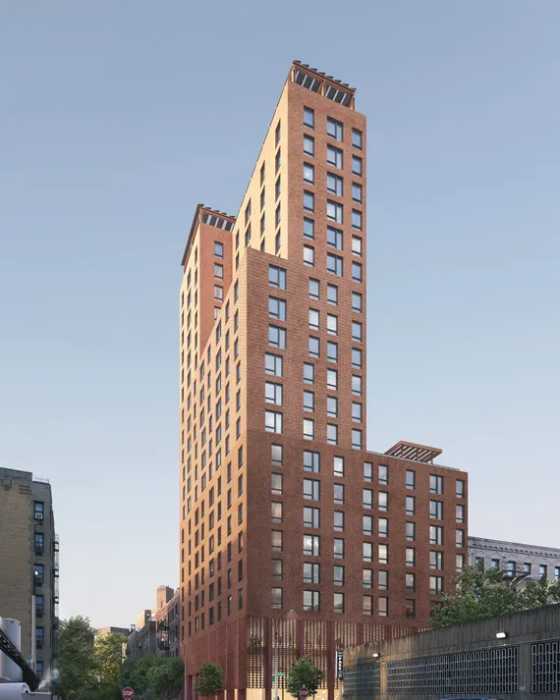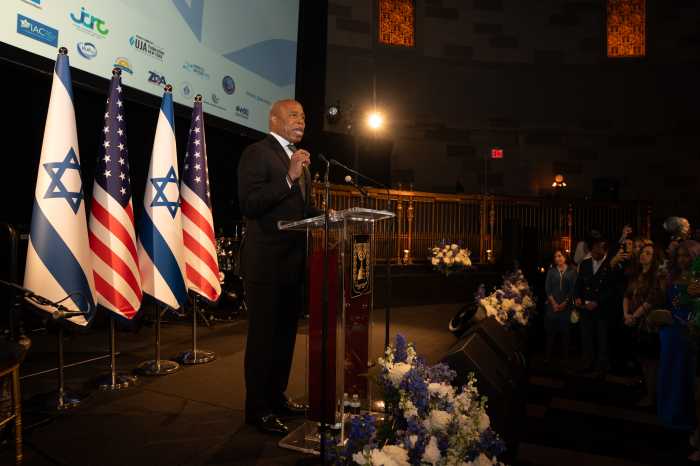Several hundred people in clingy dresses, tattoos, and/ or activist shirtsleeves turned out March 3 for Gay City News’ first-ever Impact Awards, an event to honor extraordinary activists in the LGBTQ community (a full rundown on the honorees is here). Attendees, queer and straight, descended on Brooklyn’s Grand Prospect Hall, which just may be the queerest event venue in the city with its yuuuge crystal chandeliers, gold leaf to die for, sweeping marble staircases, and oil paintings with swooning maidens.
“Everyone who enters the extravagant lobby and spectacular spaces feels taller, more important, grander,” says the Grand Prospect Hall’s website, and that certainly seemed to be true for the gorgeous activists who came to honor family and friends and also to raise money for the Point Foundation, which grants scholarship money to LGBTQ graduate and undergraduate students.
Sharp-dressed Fred Ginyard, an honoree for his work as organizing director of FIERCE, the radical organization led by and for queer youth of color, was joined by several generations of his family who all told me how proud they were to travel from Philadelphia to honor him, including sister, mom, aunt, and cousins, one of whom was a scene-stealing little girl in white lace.
Milling around the wedding-like white-and-gilt reception room before the awards ceremony, State Assemblymember Deborah Glick introduced me to Therese Rodriguez, CEO of the Apicha Community Health Center, which Glick told me serves “a citywide population that gets marginalized” in healthcare in their own neighborhoods –– primarily Asian and Pacific Islander people who are LGBTQ or have HIV/AIDS. Rodriguez, an elegant woman with gray hair who has helmed Apicha’s Health Center since 1997, later joined a large table honoring Glenn Magpantay, who received an award for his work as executive director of the National Queer Asian Pacific Islander Alliance, and in his acceptance speech called on the queer community “to fight for immigration rights” for undocumented people, a key element of NQAPIA’s work.
Novelist Roberta Degnore told me she and a friend were “two lecherous ladies trolling the room for girls” at the reception, where they’d come to honor their friend Maxine Wolfe of the Lesbian Herstory Archives, ACT UP, and the Reproductive Rights National Network.
By the coat check downstairs, a tall, stunning, and gracious African-American woman in a black dress and heels turned out to be Deborah Brennan of the Brooklyn Community Pride Center, an awardee accompanied by her studly wife, Lisa Davis, in an evening suit. In her acceptance speech, Brennan talked about “stalking the mayor of New York City down in Puerto Rico and harassing the Brooklyn borough president” in order to get the center off the ground. It provides special services for youth, elders, bisexuals, and trans and gender nonconforming people, with a strong emphasis on racial and gender parity and an ongoing writers’ group.
At the ceremony, honoree after honoree identified the same pressing needs for our community: “ending LGBTQ youth homelessness” (Angie Gonzalez, one of the two Point Foundation scholars honored, along with Tommy Craven); “economic justice, and justice for communities of color and for the trans community that is still fighting so hard for justice and dignity” (awardee Stuart Appelbaum, president of the Retail, Wholesale and Department Store Union); fighting violence (retired state senator and continuing activist Tom Duane, who said, “We are still being murdered, particularly trans women of color”); fighting for the rights of “undocumented queer people” (Angie Gonzalez, again, who strikingly told the crowd that when she came out as bisexual she had to defend against the idea that all bisexuals are “greedy or promiscuous,” and also had to deal with a friend who told her “not to get any darker in the summer, because darker skin is ugly.”)
Duane, who added, “Sure, queer lives matter. Black lives matter, too,” was looking good with partly silver hair. After he was seated, he told me how happy he was to get a chance to support Bernie Sanders for president.
“I never thought I would see the day when he could run,” he said. “I would occasionally mention capitalism on the State Senate floor, and people would look at me like I was crazy.”
In a private interview in the back of the hall, Dick Dadey, honored for his work with the Citizens Union but previously a longtime executive director with the Empire State Pride Agenda, criticized the latter group’s decision to disband in the wake of the passage of marriage equality.
“It’s an unfortunate decision that shows lack of vision,” he said, “and lack of understanding of the continued challenges our community faces. We have to make sure none of us are left behind in the fight for equality and justice.”
Anne McGuire and Marie Honan, longtime activists in the fight for a queer-inclusive St. Patrick’s Parade who came to honor Maxine Wolfe, told me they actually weren’t leaping for joy at the fact that openly LGBT people would be allowed to march under their own banners for the first time in this year’s parade.
“It feels like penance,” McGuire said. “It’s 25 years too late.”
Many trans folks were among the awardees at the Grand Prospect, including cute Emmett Findley from God’s Love We Deliver (who has a spot on BuzzFeed’s recent list of “26 Trans Guys Who Are Way Too Hot To Handle”), longtime trans and Democratic Party activist Melissa Sklarz of the Pride Agenda, Bianey Garcia of the LGBTQ Justice Project of Make the Road New York, who spoke in Spanish about working for immigration justice and justice for trans Latinas, and Carrie Davis, who oversees human services programming and policy and education services at the LGBT Community Center.
The most stunning group in the ballroom had to be the crew from the Leslie-Lohman Museum of Gay and Lesbian Art. At one point I looked across the ballroom at their table, which boasted the most extravagant head and facial hair and clothing of the event, and wondered aloud, “Who ARE those people?” I should have known they were from New York’s own queer/ trans visual art palace. The most plangent hair belonged to executive director (and honoree) Hunter O’Hanian, whose long, stylized yet curly beard and hair are among the most extraordinary gay men’s coiffures in New York.
Board member (and Stonewall Chorale artistic director) Cynthia Powell wore blonde hair in an elaborate up-do over dark roots, and a kilt and sporran. (“My fiancée’s Irish,” she said. “It’s warm for wintertime.”) That beautiful bear Jerry Kajpust (deputy director) was part of the table, as was my old Village Voice buddy Jeff Weinstein, a Leslie-Lohman board member who, back in the ‘80s, pushed for and secured the first domestic partner benefits in the country as the chief negotiator for the Village Voice staff union.
But the most striking person in attendance had to be André St. Clair, a Jamaican-American trans artist and actor who is also on the museum’s board. St. Clair, with big, powerful hair that pointed up in one direction yet down in another and still managed to be elegant, had so much appealing energy that I wanted to look at her art immediately and listen to her activist projects.


























































